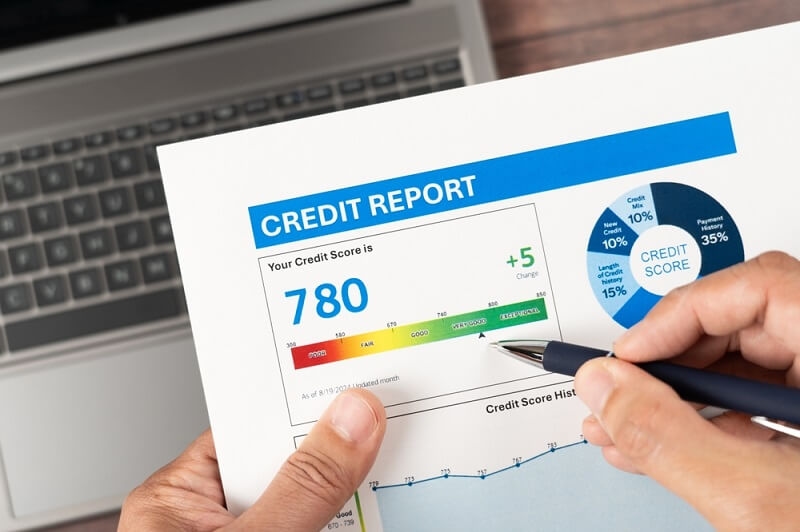
In personal finance, credit score and credit report are often interchangeable but not synonymous. Whether managing your money wisely or just starting, you must be aware of the differences. This guide will present you with everything you need to know to understand the differences between a credit score and a credit report, including what they are, why they matter, and how to keep both of them in good standing.
If you have ever applied for a loan or a credit card or signed a lease for an apartment, your credit profile most likely played a part in being approved for one of these applications. Let’s review the credit basics for young adults or well-seasoned consumers so that you can make informed decisions and avoid mistakes.
A credit score is a single three-digit number that represents your creditworthiness. A score is just a number summary of how you are likely to act based on your credit behavior—lenders use this to determine how well you are likely to repay borrowed money and how likely you are to be delinquent with your accounts.
Knowing the factors that influence your credit score can help you improve or maintain a good score:
1. Payment History (35%)
Late payments or defaults will hurt your score.
2. Credit Utilization (30%)
The amount of available credit you use—the lower, the better.
3. Length of Credit History (15%)
Older accounts indicate financial maturity.
4. New Credit (10%)
Applying for too much credit can temporarily lower your score.
5. Credit Mix (10%)
A mix of credit types (loans, credit cards, etc.) is better.

Your credit report is a detailed record of your credit history. It includes personal information, account details, payment records, and lender inquiries.
Unlike your credit score, which is just a number, your credit report is a whole document. It is updated regularly as lenders report your account activity. Financial institutions, landlords, and employers may use it to review your financial habits.
If you're searching for how credit reports work, here’s a simplified breakdown:
So what’s the bottom line in the debate on credit score vs. credit report explanation?
| Feature | Credit Score | Credit Report |
| Type of Info | A number summarizing creditworthiness | A detailed list of credit history |
| Use Case | Quick risk assessment by lenders | In-depth view of credit behavior |
| Contains | No account details, just a score | Account info, history, inquiries, defaults |
| Generated From | Data in your credit report | Data reported by lenders |
| Update Frequency | May vary by bureau | Regularly updated by creditors |
The credit score is derived from the data in your credit report. Think of it like a grade (score) based on your report card (report).
Understanding the difference between a credit score and a credit report isn’t just financial trivia—it’s fundamental to building a healthy financial future.
This knowledge is key to laying a strong foundation. Credit basics for young adults should include:
Can you level up your credit game? Here are some credit monitoring tips and improvement strategies:
Use free annual services to ensure accuracy. Look for incorrect addresses, unfamiliar accounts, or outdated info.
Many banks and apps offer alerts when something changes in your report. These tools help you stay informed without constantly checking manually.
Your payment history is the most significant factor influencing your score. Automate payments to avoid missed deadlines.
Too many credit applications in a short period can hurt your score. You can space them out and apply only when you need to.
Try to use no more than 30% of your total credit limit. Paying off balances before your statement date can also help.
You can file disputes directly with credit bureaus if you spot incorrect information. They’re legally obligated to investigate and respond within 30 days.
There’s a reason so many financial experts emphasize monitoring. Here’s what you can expect from reliable tools:
These credit monitoring tips are not just for those with bad credit. Even if you’re doing well, staying proactive can prevent future issues.
Let’s bust some common myths:
False. This is a soft inquiry and does not affect your score.
Not always. It can shorten your credit history and raise your credit utilization.
Wrong. Lenders may use different models, like FICO or VantageScore, leading to slight variations.
Incorrect. Your income is not reported to credit bureaus. It's your payment behavior and account management that matter.
New to the credit world? These steps can help you build a strong financial reputation:
Recognizing the distinction between a credit score and a credit report is fundamental to managing your financial life. Your credit score is a snapshot, while your credit report is the whole picture. Tracking your credit report can identify mistakes, prevent fraud abuses, and improve your financial wellness overall.
Understanding how credit reports work and what impacts your credit score, whether you are just starting or recovering from previous credit mismanagement, will allow you to control the direction of your financial future. Continue moving forward, efficiently managing your credit and finances, and embrace the newfound knowledge that financial literacy can provide you for the rest of your life!
This content was created by AI